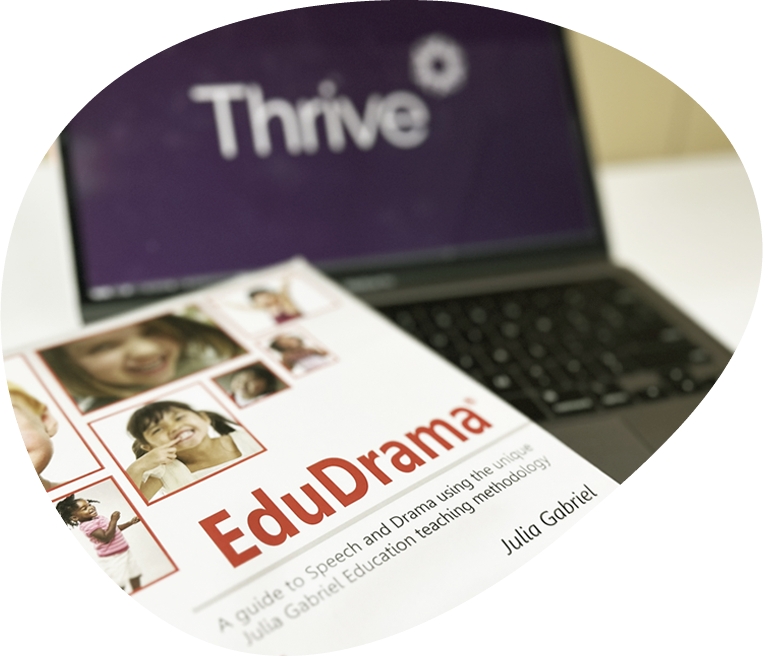About Us
EduDrama® Methodology
The Julia Gabriel EduDrama® philosophy is a unique approach to education which infuses wonder, curiosity, and self-discovery into a child’s learning journey, fostering creativity, confidence, and collaboration.
At the heart of EduDrama® is a Mindful Educator. Programme Facilitators at Thrive understand the importance of individualised attention and the nurturing of relationships. We aim to build strong connections with children and parents, creating a supportive and inspiring learning community where children feel empowered and secure in this home away from home to learn and perform at their best.
Children who attend Thrive enjoy a thoughtfully curated Enabling Environment. This offers them opportunities to complete their school work and revision, engage with their peers, refresh and recharge after a busy day at school.

An Enabling Environment
is an appropriate space physically in terms of up- to-date classrooms, equipment and resources and also a nurturing emotional space for learning. This means an evolving, dynamic physical environment with changing display and learning materials that our children are excited and curious to visit each day. Most importantly it provides comfort, safety and security for each learner to be who they are, learn in the best individual way and to feel valued and cared for.
Clear Learning Structures
for both learners and educators allow for our expectations to be carried out through careful planning, clear schedules and discipline across all centres and classes. Our mentorship and supervision structures support teachers in meeting expectations. Teachers plan and document progress for each child, sharing it with mentors, supervisors and parents regularly. Educators who are supported in this way also know we trust them to leave a lesson plan for a ‘teachable moment’ if they deem it right.
Parents as Partners.
We engage parents in their children’s education to form a partnership with educators and a strong support base for each child. Parents know their child best. Educators have specialist skills. Together they create a balanced, holistic view of a child that becomes a loving, supportive foundation for learning.
Professional Development
keeps educators thriving on a continuous learning path that both challenges them and encourages them to share their learning with colleagues. Our termly training plans ensure ongoing professional development for all staff across a variety of relevant disciplines.
Drama
is our key to engagement, imagination and creativity. All our teachers are EduDrama-trained to be able to use drama-based techniques to excite children’s desire to participate, explore and discover. This we do through extending their imagination and introducing a wide range of stimulating literature in poetry and prose, with educators structuring drama to bring in familiar characters and situations so that children can take the lead. In this way our students practice their language, empathy and leadership skills to develop in healthy ways.
Positive Communication
as demonstrated by an educator who sees the best in each learner and communicates this through enjoyment and excitement for effort and progress. As healthy development demands clear articulation of a positive message, our educators focus on communicating their pleasure in getting to know each child, greeting them each day, understanding challenges, responding and showing an interest in children’s desire to communicate. We do this through physical, vibrational and verbal communication believing that the foundation of relationships lies in everyday conversation and exchanges.
Positive Discipline
encourages good behaviour through close connections between adults and learners. Educators are clear and expressive about expectations and boundaries, to build connections and mutual respect in our community. Parents learn how to carry our practices forward to follow up at home. This framework allows us to ensure consistency across all our centres.
Expressive Speech
Our educators are chosen and trained to be clear, colourful, articulate models for students’ speech. We emphasise our belief in the importance of clear speech – the medium through which we communicate with one another – in our classroom communication and through exercises as part of regular, scheduled Speech Communication Arts sessions. These motivating, specialist-lead sessions enable children to become confident, expressive speakers and aware, empathetic listeners.
Mindful Educators
aware of themselves and their effect on others, conscious of the individual needs of each learner and able to modify their communication and our programme to ensure success for each student. A mindful educator knows that they create the relationships in which learning takes place and practices mindfulness to ensure this can be optimal, healthy and nurturing.
